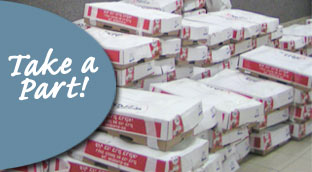| |
|
 |
| |
It happened just before the holidays. Miriam checked the refrigerator, then the pantry. Not much in either. Time to stock up.
"What am I going to do?" she asked herself as the cold truth gnawed at her. Subsisting on her disability payments had never been easy. Her late husband, an unskilled worker, had left no insurance policy. Now, life was about to get harder. |
|
| |
Her daughter, who had attended a special education school for the past 12 years, had just turned 18. That meant her child welfare allowance was history. Miriam would continue to receive the governmental stipend for her son for two more years, and then…they would have to make do with her disability check.
|
|
|
| |
Getting around on two crutches hurt, but Miriam had managed with the pain for more than ten years, ever since the cartilage in her joints started doing a disappearing act. "Bite the bullet," she would tell herself, when even pain medication didn't help.
Yes, she could manage with pain, but she and her children couldn't manage without food. They would need some food, at least. |
|
|
|
| |
Prices had risen, but her monthly income had just shrunk, because Michal had turned 18. Michal still had no marketable skills – she'd need at least a year of training, and then placement in a protected workshop.
"Don't feel so sorry for yourself," Miriam scolded herself. "Think about Lili, next door, with eight kids under the age of 12.
"Sure, her husband works as a teacher, and they used to get on fine with his salary plus the child allowance benefits from the government. Now, they're not going to get along fine, because the government just took a big chunk out of the allowances. The government's not willing to help support more than a few kids per family. Lili can't go out to work; her four month old twins need her. Besides, if she went out to work, she'd pay most of her income to the various baby-sitters she'd need. After all, you can't bring in one babysitter to take care of eight kids. Only the parents can handle that kind of scene. She'd have to drop off the children at day care. |
|
|
|
| |
|
| |
"I wonder," Miriam sat up sharply as a shocking thought snaked its way into her head. She winced from pain, partly from the intrusive thought, partly from her sudden movement. "I wonder if those kids are going to go hungry?
"I just don't understand the strange things that have been going on. The government's cut the child allowances so more people will go out to work. But most jobs don't pay a living wage that also covers day care for the kids. Maybe they're trying to tell people not to have kids? Can't be. Mmm." |
|
 |
|
| |
A knock at the door interrupted Miriam's musings.
She rose stiffly, leaning heavily on the right crutch. Twisting the butterfly-shaped lock she'd had installed to make opening the door easier, she heard Lili's two-year-old son chattering happily on the other side of the door. Then she saw Lili, with her twins in the double stroller and the two-year-old standing next to her.
"Miriam, I just got back from my morning walk with the little ones, and I saw the most wonderful advertisement posted in the entrance to our building," Lili gestured to the ground floor entrance five meters from where the women stood.
"There's an organization that's taking orders for meat, fish and poultry for the holidays – and listen to this – it's at cost. That means the items are cheaper than at the store, because this organization – Yad Yehuda – isn't taking a profit. I thought you would be interested, so I wrote down the phone number for you." |
|
|
|
| |
|
| |
Miriam gratefully accepted the slip of paper with Yad Yehuda's telephone number and Lili led her little ones into their apartment just a few steps beyond Miriam's door.
Miriam debated whether it was worth the effort to walk down the hall to take a look at the Yad Yehuda advertisment. "I've got the number right here, so I really don't need to look at the flyer taped to the wall in the entry. It's better if I save my strength for making lunch for the kids."
That thought reminded her of her earlier worries about all the empty space in her refrigerator and pantry.
Miriam eased back into the apartment, twisted the butterfly-lock to the "shut" position and headed for the telephone.
Pressing the numbers for Yad Yehuda on her telephone's keypad, Miriam reflected that, although her order for the holidays would cost less than usual, thanks to this organization, she would still need to cover the costs. She hoped two post-dated checks would be acceptable.
What Miriam didn't know, is that the people at Yad Yehuda specialize in holiday surprises for their clients.
The first surprise is the price of the products. Meat, fish and poultry are made available not "at cost," but below cost. So Yad Yehuda actually operates at a loss. Only a financial loss, though.
But that's not all. Those who run the Yad Yehuda enterprise in Israel are in touch with the rabbis of the various neighborhoods in which they operate. Perhaps it's more accurate to say that the neighborhood rabbis are in touch with the folks from Yad Yehuda. The rabbis know Yad Yehuda's policy: if a family can barely scrape together the funds to pay for their order – even with post-dated checks – the checks will be shredded without being cashed.
And that's the second surprise. A rabbi who knows of a family in such straits can call up Yad Yehuda and say, "Don't cash their check." Anyone who picks up a Yad Yehuda order writes a check, or checks. Some of those checks, however, will never be cashed.
The first time a customer sees that according to his bank statement, the checks he wrote to Yad Yehuda weren't cashed, he's puzzled.
When the checks for the next order aren't cashed, he understands.
That's when surprise and gratitude fills his heart.
And that's how struggling famlies like Miriam's – and Lili's – succeed in setting their tables, with a good supply of nutrious food, for the holidays.
Yehuda's hand – Yad Yehuda – is still reaching out, across space and time to feed the hungry among his people. With your help. Please, give generously.
|
|
|
|
| |
|
|
|
| |
|
|
|
